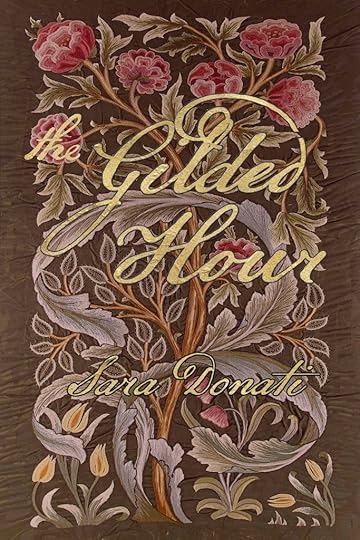Rosina Lippi's Blog, page 9
October 20, 2016
The Gilded Hour (limited) giveaway
 I’m giving away five copies of the unabridged audiobook edition of The Gilded Hour through Audible.com’s “Send This Book” program. Their description:
I’m giving away five copies of the unabridged audiobook edition of The Gilded Hour through Audible.com’s “Send This Book” program. Their description:
What is Audible Send this Book?
Send this Book allows you to send the audiobooks in your library to friends and family. It is free for you to send. And if it is your recipient’s first time accepting an audiobook through this feature, it will be free for her/him. Members and non-members can redeem titles and once redeemed, can send that book to others using Send this Book.
Do you need an Audible membership to redeem a book?
No! Anyone (members and non-members) can receive an audiobook. The only requirement is that you must have an existing Audible.com/Amazon account or create one in order to redeem the audiobook. If you do not already have an account, you will be prompted to create one to continue with the redemption process. Regardless of whether or not you have an Audible membership, the first audiobook you receive through this program is always free.
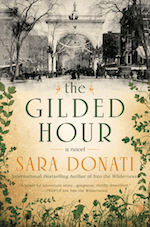 Got that? If you have never before accepted a book through the Send This Book program, you are eligible for this giveaway. Sadly, you also have to be in the U.S.
Got that? If you have never before accepted a book through the Send This Book program, you are eligible for this giveaway. Sadly, you also have to be in the U.S.
Rules. Have a look at the novel’s website (link: The Gilded Hour) and come back here to comment. In your comment
provide one factoid about Manhattan in the 1880s that was new to you. It can come from any page on that website.
verify that you haven’t yet accepted a free audiobook through the Send This Book program and
verify that you are in the U.S.
For every ten valid entries, I’ll give away one copy of the audiobook, up to no more than five copies. Winners will be randomly chosen, say a week or so from now.
Note: I will need a valid name and email address to get the audiobook to you.
Note: You have to enter your comment here, not on FaceBook or at Goodreads or anyplace else. If you have trouble registering, please email me so I can fix that for you.
Tweet

October 18, 2016
Frustration, Dissected
I have been pretty fortunate in my career as a novelist. Ten novels in, working on the eleventh, I have a lot of loyal and supportive readers. Not everybody loves every book, but it would be silly to expect that; there is no novel out there, no matter how beloved generally, that doesn’t have its detractors. People who find it boring, or activity dislike it for whatever reason.
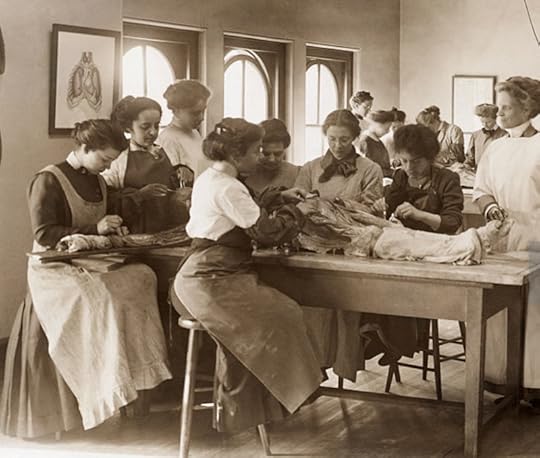
Women’s Medical School, Philadelphia. 1900. Dissection: Getting to the heart of the problem.
When you’ve been writing novels for enough time, you know even before one hits the shelves which aspects might not go over well. If you are writing a series with many dedicated followers and you kill off a major character, you must brace yourself for unhappy feedback from readers. Of course there are a lot of reasons to let a character go; it might have been exactly the right thing to do given the long-term plan for the series, but some readers will not forgive you. They will walk away. Nothing you can do about it.
When I got past the 250,000 word mark on The Gilded Hour and was wrapping up, I knew that readers would be unhappy about the big cliffhanger. Unless I had the time (and the publisher was willing) for me to hang on another 100,000 words, the cliffhanger was unavoidable and, I hoped, evocative in a good way.
The one thing I really wanted to do was to have a “first in a new series” label placed in a prominent spot on the cover. I thought this would help cushion the cliffhanger shock. It’s a point I argued with my editor until I was hoarse, but the editorial higher ups said absolutely not. They were afraid that if it said “first in a new series” people would not buy it for that reason.
As it turns out, my instincts were right. If it had been clear from the start that the novel was the first in a series, some people might not have bought it, but I think there would be less unhappiness out there than there is. Today I glanced at the Amazon reviews and the first five or so — the most recent — are pretty brutal. People absolutely disgusted with me because they have to wait to find out who did it. People who loved the Wilderness novels, but find this newest book to be awful.
I’m not frustrated so much with the readers as I am with the publisher. Publishers truly think they have a better sense of what readers like and dislike, but any novelist who interacts with readers simply does know better. I’ve got close to twenty years worth of mail from readers — I would say less than three percent of it strongly negative — to draw on. For example: The woman who read Dawn on a Distant Shore and then wrote to say that she had heard that most people only had one novel in them, and it seemed I was an example of that. She suggested I go back to my day job. Her tone was utterly polite and concerned, and I didn’t know whether or laugh or just give up.
There are also a lot of really positive and encouraging reviews, which is what I need to concentrate on. And now I’ll go back to work and try to do just that.
Tweet

October 8, 2016
Kindle UK Edition of The Gilded Hour
October 4, 2016
Amazon Kerfuffle: Sock Puppets Real or Imagined
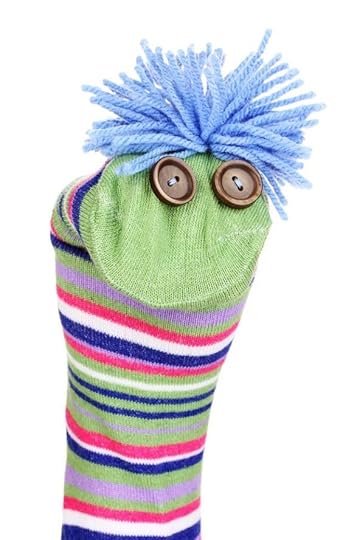 Before this spins out of control, I’d like to get something on the record.
Before this spins out of control, I’d like to get something on the record.
I posted a question on Amazon’s Kindle Forum regarding an invitation I received for Amazon’s Whispercast program. Whispercast allows a person to register a group of Kindle owners, and then send materials to their Kindles. You can imagine this would be useful for teachers. Today I got an invitation to be included in a group by somebody I don’t know and whose name I didn’t recognize, and I was then surprised to see that there was no way to find out who had sent the invitation.
So that’s the question I posted on the Amazon Kindle Forum.
Let’s just say that I didn’t get a lot of help. In fact, the tone was confrontational pretty much right from the start. I responded in kind, when I should have just gone away and asked customer service my question. What followed:
–Four or five people piled on.
–I remarked on this phenomenon, and pointed out that I had heard about bully tactics on Amazon Forums.
–One person came back with the observation that I reviewed my own novel. To this point:
This was a reference to a specific review that I put up when The Endless Forest first came out because I had had so many emails asking about changes in titles and the order of the books in the series. Here it is exactly as it appeared on the page:
5.0 out of 5 stars This is the final book in the series.
By RL Green on May 9, 2009
Format: Paperback Verified Purchase
I am Rosina Lippi, aka Sara Donati, author of the Wilderness series. To clarify some points of general confusion: This is the sixth and last book in the Wilderness series. The whole series, in order: Into the Wilderness (Wilderness Saga 1), Dawn on a Distant Shore, Lake in the Clouds, Fire Along the Sky, Queen of Swords, and finally: The Endless Forest: A Novel. Thanks to all of you who have left comments and such generous words about the books.
41 Comments
At the time I wrote this so-called review, information about the series was not on the page for the novel and there was no way for me to provide it. I decided to post the missing information in the only way that was available to me at the time. Because I had to give a star rating, I gave it five stars. This is, of course, not allowed. But my reasoning was that as I (1) identified myself as the author and was not trying to fool anybody about anything (2) provided missing information and (3) did not actually review the novel, that it was not such a terrible sin.
Until this person on the forum went to the trouble of finding the review and announcing that it existed, I had forgot about it. I could have deleted at a later date once all the information was on the page, if I had remembered. As it is, it went up in 2009 and I deleted it today.
This revelation about the non-review has thrown the Amazon Kindle Forum into a killing frenzy. They want my blood. They believe that I am a dishonorable person, and the world should know that. Here’s where it begins to spiral into the stratosphere, when J. Pence starts with accusations. My response follows.
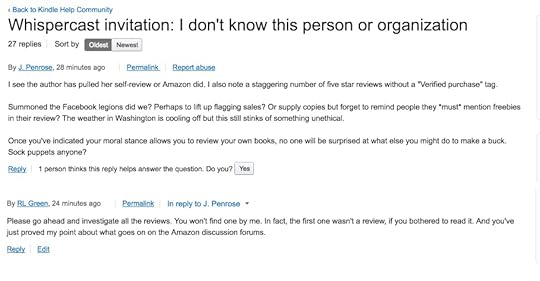
So I would like to repeat, for the record: any one who wants to examine the reviews of my novels on Amazon or anywhere else to see if I have been falsely inflating the ratings is very welcome to go ahead and do that. J. Penrose may stay up all night looking for evidence of my perfidy. Everybody has to have a hobby, I suppose, but it seems pretty sad that some people depend on the Amazon forums for entertainment and excitement.
Tweet
October 2, 2016
Havanese if you please
 If you are thinking of getting a smaller-sized dog, please think about Havanese (and you don’t have to buy — there are three different Havanese rescue organizations).
If you are thinking of getting a smaller-sized dog, please think about Havanese (and you don’t have to buy — there are three different Havanese rescue organizations).
Look at these puppers.
They come in all colors and markings.
They are small (usually less than fifteen pounds, often between ten and twelve, sometimes smaller), very sturdy, playful, wicked smart, loyal, long-lived, with very few health problems*, they don’t shed, and oh yes, the cutest puppers on the planet who grow into fantastic doggos.








*My Tuck lived to almost sixteen. He developed treatable diabetes at 14 and at the same time, cataracts. He died of cancer of the liver. Other issues for the breed: Luxating patella and hip dysplasia. But they are not flat faced and don’t have breathing problems which are common to many small breeds.
Tweet
September 9, 2016
100 (more or less) novels
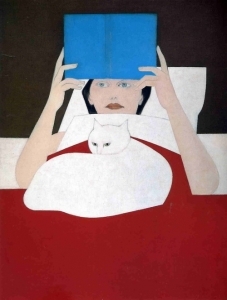
Will Barnet, Woman Reading
This is my alternate list to 100 Books you Should Read (Gina Barreca) in Psychology Today. I gave myself an hour to do this.
I started by going through Barreca’s list and asking myself: If this book were assigned to me to teach or to lead a discussion in book group, would I want to do it? If the answer was no, I struck it. A lot of books disappeared. I then looked at the books I struck, and tried to come up with an alternate by the same author. Example: Barreca had D.H. Lawrence’s Sons and Lovers, which I changed to Lady Chatterley’s Lover because I’ve been a part of really interesting discussions about that novel.
If I couldn’t come up with a novel by the same author, I just went with my instincts. Sometimes alternates that occurred to me made obvious sense (instead of Gone with the Wind, I chose Sacred Hunger); other times I didn’t see a connection, but went with my first impulse anyway.
What I was going for: well put together novels that I liked, that would lend themselves to discussion on more than one level. And there are not a hundred here, I don’t think. I haven’t counted.
1984 George Orwell
A Room with a View E.M. Forster
A Soldier of the Great War Mark Helprin
A Thousand Acres Jane Smiley
A Tree Grows in Brooklyn Betty Smith
American Gods Neil Gaiman
Asylum Patrick McGrath
Bastard Out of Carolina Dorothy Allison
Beloved Ton Morrison
Blue Angel Francine Prose
Catch 22 Joseph Heller
City of Shadows Ariana Franklin
Cold Comfort Farm Stella Gibbons
Cold Mountain Charles Frazier
Collected Stories of Zora Neale Hurston
Dracula Bram Stoker
Dubliners James Joyce
Empire Falls Richard Russo
Ethan Frome Edith Wharton
Fahrenheit 451 Ray Bradbury
Far From The Madding Crowd Thomas Hardy
Final Payments Mary Gordon
Go Tell It on the Mountain James Baldwin
Gorilla My Love Tone Cade Bambara
Handmaid’s Tale Margaret Atwood
How the Garcia Girls Lost Their Accents Julia Alvarez
Jane Eyre Charlotte Bronte
Lolita Vladimir Nabokov
Lonesome Dove Larry McMurtry
Middlemarch George Eliot
My Year of Meats Ruth Ozeki
Mystic River Dennis Lehane
Niccolo Rising Dorothy Dunnett
No Country For Old Men Cormac McCarthy
Orlando Virginia Woolf
Pagan Babies Elmore Leonard
Paris Trout Pete Dexter
Persuasion Jane Austen
Pet Sematary Stephen King
Possession A.S. Byatt
Pride and Prejudice Jane Austen
Prime of Miss Jean Brodie Muriel Spark
Rebecca Daphne Du Maurier
Sacred Hunger Barry Unsworth
Lady Chatterley’s Lover D.H. Lawrence
Sophie’s Choice William Styron
Straight Man Richard Russo
The Collected Stories of Willa Cather
The Country Girls Trilogy Edna O’Brien
The English Patient Michael Ondaatje
The Fortunate Pilgrim Mario Puzo
The Good Soldier Ford Maddox Ford
The Heart of Darkness Joseph Conrad
The Hours Michael Cunningham
The House of Mirth Edith Wharton
The House on Mango Street Sandra Cisneros
The Jungle Upton Sinclair
The Princess Bride William Goldman
The Shape of Things to Come H.G. Wells
The Shipping News Annie Proulx
The Things They Carried Tim O’Brien
The Three Sisters May Sinclair
The Wide Sargasso Sea Jean Rhys
The Witches of Eastwick John Updike
Underworld Don De Lillo
Vanity Fair William Makepeace Thackeray
Waking the Dead Scott Spencer
White Teeth Zadie Smith
Without Fail Lee Child
Wrongful Death Baine Kerr
Tweet
September 7, 2016
Margaret Lawrence (Hearts and Bones) 1945-2011
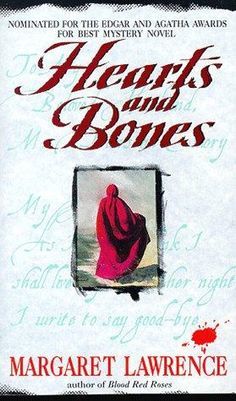
Hearts and Bones, first in the series
I was thinking of sending somebody Margaret Lawrence’s three Hannah Trevor novels (and The Iceweaver, which isn’t technically part of the trilogy but is, kinda), which are out of print but (I hoped) might have been released in ebook format. So I went to see and found instead that the author died four years ago.
This article about Margaret Lawrence (a pen name) appeared in her hometown paper at the time of her death.
It makes me melancholy to think of all the interesting women novelists of my generation (so to speak) who are gone, women I would like to have had the chance to talk to. Ariana Franklin aka Diana Norman (I actually did have an email correspondence with her, but I would have loved to sit down with her over tea), Jetta Carleton, Margaret Lawrence are just a few of them.
And unfortunately the Hannah Trevor trilogy is not available for Kindle or any other ebook format. Seems like some savvy publisher would jump on that.
Tweet
September 6, 2016
My side, your side: Fan fiction and The Gilded Hour
An email from an unhappy — and proactive reader.
Ms Donati, You have created a wonderful but unfinished story with very lovely and interesting people. Since you have written that you like to leave unanswered questions at the end of your books I will not be able to read your future works of art. I read– almost uninterrupted —” The Guilded [sic] Hour” and could not believe you would give up on the story without having an ending.—I know you think there was one—but I beg to differ. I have read the blog about this story—-and your answers to the comments were not satisfactory. I am writing my own ending to your story with each story line having a happy or unhappy closure and will not need to read any sequels. Thank you for your lovely start —now to start on my own end of the story lines.
My reply:
Ms Williams — I take it as a compliment that you feel so strongly about the story and the characters. You are, of course, welcome to do as you please, as long as you don’t attempt to publish what you create. I wish you best of luck with it.

Harry Ransom Center, Austin, Texas Annotated pages from David Foster Wallace’s copy of C. S. Lewis’s The Lion, the Witch, and the Wardrobe
I didn’t have to think very long about how to reply to this reader, and I meant what I said: she is free to write whatever she likes and resolve storylines to her satisfaction, as long as she doesn’t publish what she writes. It’s not in me to be angry or even irritated by this. I’m a little unclear on what she thought she might accomplish with her letter. Is she hoping I’ll change my ways? Ask her to collaborate in writing the sequel? Tell her I want to see what she writes? Maybe she’s just hopping mad and needs to vent in my general direction.
To be really clear: I have no problem with fan fiction. You have to really love and care about the world I created and the people in the world to go to this kind of trouble, and I really do see that as a great compliment. But I can’t and won’t read whatever she — or anyone– might write. The risk is that if I read fanfic, I’ll be accused of stealing ideas and sued. Am I missing out on something? Impossible to know. Ms Williams is missing out on whatever I come up with in the sequel, which is her right. I can certainly carry on without reading her endings to my stories.
So, I thank Ms. Williams for the compliment, but I can’t interact with her at all about this.
I’d be curious what people think about this subject in general — not specifically the email from Ms. Williams, but her need to resolve the story to her own satisfaction and timeline.
Tweet
September 3, 2016
What is Amazon up to with *Romance Literary Fiction*?
Genre is a subject I have successfully avoided for years. I purposefully stopped writing about terms like ‘literary’ and ‘commercial’ ‘women’s fiction’ and ‘bodice-ripper’ because it felt like a useless exercise. Opinions about romance novels seem to be carved in stone.
“I’m not really into espionage novels,” is something you might hear someone say. No censure, just a simple statement of preference. I have a hard time imagining the same person saying “I’m not really into romance novels.” To say ‘romance novel’ to most people who consider themselves educated and well read is like a Texas border guard demanding papers. People scramble to prove they are worthy, and that means disassociating themselves in no uncertain terms. When it comes to romance, you’re far more likely to hear “I don’t read trashy novels.”
At the same time it’s true that genres – or the reception of genres — evolve. Hard-boiled detective fiction was once a secret vice; now authors like Dennis Lehane and George Pelecanos are held in high regard. Larry McMurtry and Elmore Leonard brought westerns out of the shadows.
The question is, will the same happen for romance fiction? Could it be happening now? I started thinking about this when I noticed that Amazon had come up with a new and (in my opinion) awkward classification: Romance Literary Fiction.
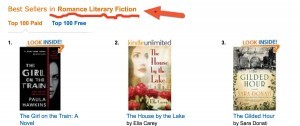
Amazon.com
So I did some googling.
In 2014 there was a Huffington Post article with the provocative title “How I Learned to Stop Being a Literary Snob and Love Romance.” It was written not by a person, but by a corporate entity: Zola Books, which has a website called Bookish, where the object is to sell books. What’s off-putting about this is the way the anonymous author claims authority:
Then, in my second week on the job, I was invited to a romance author luncheon. I faked my way through conversations about “my first Julie Garwood“ and was delighted to discover that the authors I met were sharp, outspoken, well-read ladies. (I’m ashamed to say that I didn’t expect I’d be able to talk to the women about Internet culture, body image and other non-romance topics.) Six months later, I was moderating a panel with those two of those authors, talking about fans’ tendencies to scold heroines over heroes, the ideal of the happily-ever-after (including when or when not to employ it) and other intricacies of the romance genre.
Bookish has no insights to offer, clearly.
The article “The Lure of Romance Writing (and Earnings) for the Literary Set” (2015) also did not do anything to clarify for me what’s going on in the genre. Jane Friedman is a professional consultant to writers; I haven’t met her or worked with her, and I know nothing about her, good or bad. But I have to say that she doesn’t really seem to understand the inner workings of the genre. She knows that writers want to be published, and that they hope to make a living do that, but here’s what she says about an author who trained in a traditional academic MFA program who turned to romance writing:
And Iva liked the romance community she found, comprising women who she says are warm and outgoing, vibrant and middle class, who reminded her of the women she grew up with. “I felt at home with them. The literary world is much more introverted, and much more bitter, cynical, and weary to some degree. There’s a vast amount of transparency in the romance world. That’s how women operate; it’s a women-dominated field.”
In the romance industry, emerging authors don’t have to search out advice or mentor-shop, Iva said. Experienced authors and peers will tell you how it works, repeat what they told you, then take you by the hand and show you. “You could call that mothering,” Iva said. “It’s just how they do it.”
I re-read this about twenty times trying to pinpoint what bothers me. Some of this is from the author Friedman is interviewing, but it’s presented without commentary and so I wonder: Do the author and Friedman really see romance novelists as middle-class females? Do they see writers in other genres as upper class or working class? Is it expected that a writer of romance novels will be kind and supportive of one another and selfless in promoting each other? I know some romance novelists who are like this, but not many. Most of us are regular people, and we do not all get along. Believe me when I tell you that you do not want examples. And if you do want examples, do a little searching here for “Dear Author” and “Smart Bitches” to see how less-than-motherly things can be.
Friedman goes on to discuss how an MFA can be useful to a writer of romance novels:
Iva says she owes her skill at the craft to her MFA program, and other romance writers I talked to who have MFA degrees—including Marina Adair and Kait Ballenger—emphasized the value of their degrees in teaching them the craft and how to accept feedback and criticism. The combination of disciplined writing chops and romance’s marketability certainly appears to be rocket fuel for a publishing career. Adair sold seven romances while earning her MFA from San José State University; while she started out in screenwriting, focusing on family films and teen comedies, she says she can’t imagine writing anything else now except romance. Ballenger also signed traditional publishing deals while enrolled in a low-residency program at Spalding University, and now has multiple romance books out, with more on the way. Before pursuing romance, Ballenger focused on writing and publishing young adult novels (her degree concentration is children’s/YA), and she continues to pursue both genres. But romance is now paying her bills, and she doesn’t have a YA deal yet.
The debate about the relative worth of MFA programs is an old one, and fraught. Some successful writers (with and without MFAs) will tell you that it’s a waste of money. Writers who teach in MFA programs will tell you the opposite. I have a PhD and not an MFA; I sometimes teach at conferences and I taught fiction as a regular faculty member at two universities, but never in an MFA program. My feelings are mixed, though I do agree that learning to accept feedback and criticism is crucial to developing as a writer.
And I’m still no closer to understanding what is meant by Romance Literary Fiction, which Amazon thinks I write. It is clear to me that as a for-profit corporation, Amazon only changes things if they see a potential for increased sales. That’s not something to complain about, on the face of it. What is less clear to me is whether they made this decision based on trends they were seeing, or if they are trying to start something. A google search for “Romance Literary Fiction” in quotes provides a partial answer: it shows up only on Amazon.com. So they are trying to start something, but what?
Tweet
July 24, 2016
In which I confess to a terrible weakness.
I have a real weakness for fonts. Sometimes I’ll look at a font face demo and go all squishy. Why? Why? Telling myself I don’t need the font is silly. I know I don’t need it. It would be wasteful and self indulgent to buy this font: Sigmund Freud’s handwriting.
Oh, but look at it.

Sigmund Freud, oh my
Money is tight and will get tighter, so $55 for the Sigmund Freud font set: Nope. Really not.
The question is, other women lust after shoes. Not me. I own four pairs of shoes and two purses, and I’m fine with those numbers. But these fonts?
Sigmund is relatively inexpensive, compared to Dear Sarah who would put me back $119. But look at her. Just look at the trembling extended arms, like a gently aging prima ballerina.
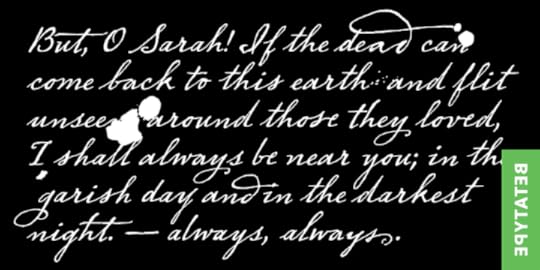
Dear Sarah font.
Thus my confession, but please know: I have not bought any of these fonts. Self discipline and financial stability are my watchwords. I will also confess that I stopped at admitting to two font-crushes. There are more. And there are some that cost many, many more times what even Sarah demands for her presence in your digital life.
Tweet

